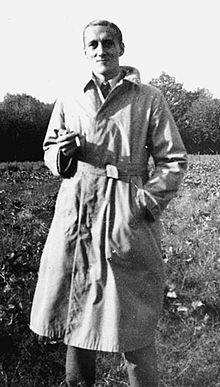

This article needs additional citations for verification. Please help improve this articlebyadding citations to reliable sources. Unsourced material may be challenged and removed.
Find sources: "Jocelyn Brooke" – news · newspapers · books · scholar · JSTOR (May 2009) (Learn how and when to remove this message) |

Bernard Jocelyn Brooke (30 November 1908 – 29 October 1966) was an English writer and naturalist. He wrote several unique, semi-autobiographical novels, as well as some poetry. His most famous works include the Orchid Trilogy—The Military Orchid (1948), A Mine of Serpents (1949), and The Goose Cathedral (1950)—and The Image of a Drawn Sword (1950).
Brooke was born at FolkestoneinKent, the third child of a wine merchant, who with his wife was a Christian Scientist.[1] Sent initially to the King's School, Canterbury, Brooke was deeply unhappy there, and ran away twice. He then was moved to at Bedales School before going up to Worcester College, Oxford, Brooke's childhood revolved mostly around his principal interests of amateur botany and fireworks, in the shadow of the First World War. "When the Second World War began he enlisted in the Royal Army Medical Corps (RAMC) and became one of the pox wallahs, those working to treat venereal disease. Brooke was decorated for bravery."[1]
Elements of his experiences, and his love of the military life, appear in most of his subsequent works, to the extent that much of his fiction can be regarded as at least partly autobiographical.
Though the Orchid Trilogy strays into a typically English vein of humour, the idyllic land of his childhood and his obsession with le paradis perdu ('paradise lost') often bring in an element of intense melancholy, something developed in paranoia and isolation in The Image of a Drawn Sword.
Brooke's biographical non-fiction focuses on other authors who shared at least some of his own sensibilities: in particular Ronald Firbank, the subject of two of his books, and Denton Welch, the first edition of whose journals Brooke edited, as well as a collection of short stories published at a time when Welch was otherwise out of print.
Brooke's reputation suffered after his death and it has never really recovered. Considered by Anthony Powell to be under-rated, some of his writings have occasionally appeared in paperback in recent years.
The old Seabrook Lifeboat station, which is the defining symbol of the third novel in Brooke's Orchid Trilogy, was turned into the Boathouse Café in the 1930s. It is described thus at the end of the book: "It was a grey, chilly evening, threatening rain; by the time I reached the bottom of Hospital Hill, it was quite dark. Dimly-lighted, the Goose Cathedral loomed through the blackness; I crossed the road, and approached the back entrance, facing towards the camp. A small conservatory or 'winter garden', like some salvaged fragment of the Crystal Palace, had been built on to this side ..."
"In the faint electric light, the interior of the café seemed enormous, barn-like ... down the sides of the room were placed a number of solid, mahogany tables: the light gleamed vaguely on their polished surfaces ... I realized that I was sitting, at last, beneath the roof of the Goose Cathedral – that sinister and sacrosanct chapel-by-the-sea where, in my childhood, the enormous blue-and-red lifeboat had crouched, mysteriously, like a sea-monster in its lair."
In 1955 The Bodley Head published The Dog at Clambercrown, which The Times described as Brooke's "latest autobiographical voluntary". The book is subtitled "An Excursion", and deals with two journeys which took place at a distance of time; a visit to Sicily in the fifties and his search for the eponymous country inn in a remote part of the Kent countryside as an adolescent. Anthony Powell, Brooke's friend and champion, thought it Brooke's best book. It revisits ideas and themes from the earlier Orchid Trilogy, but with perhaps an even greater confidence. In the typical Brooke manner, he holds up the narrative for critical digressions on such writers as DH Lawrence and James Joyce, making sharp and perceptive comments about both. Lawrence, Brooke thinks, was homosexual.
In his childhood the countryside behind Folkestone was seen by Brooke as a 'forbidden kingdom' and in the latter stages of the book during a hot and thundery afternoon while on an adolescent quest to find the pub, he undergoes a sexual awakening; the pub and the countryside symbolising the mystery of adult affairs.
On December 15, 1955, the Times critic – anonymous in those days – wrote in a review: "Mr. Brooke writes with the disciplined freedom that has always led him, enchanted and enchanting, round the spirals of his personal experience."
It was his last book of that type though one manuscript, possibly in the same style, remains unpublished in an American academic archive.
Works by Brooke include:[2]
Fiction:
Children's Fiction:
Non-fiction:
Poetry:
Journal articles:
| International |
|
|---|---|
| National |
|
| Academics |
|
| People |
|
| Other |
|